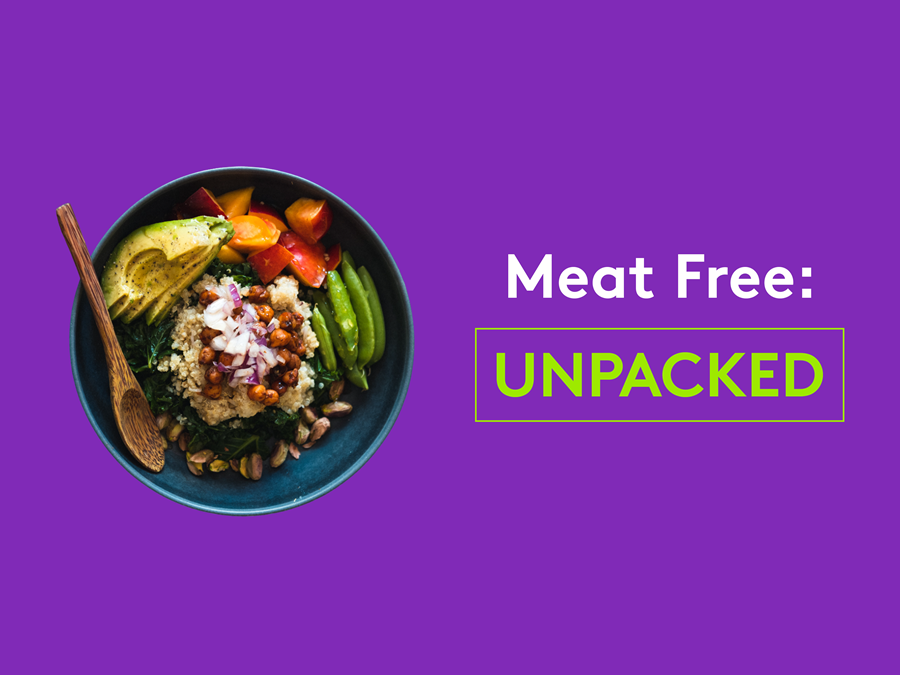It's been an unusual and tumultuous few years for consumer-facing businesses. From the pandemic to the cost of living crisis, we’ve seen trends in people’s behaviour that would previously have taken a decade to play out, accelerate over just 36 months. While it can feel chaotic and disorienting at times, states of flux almost always create opportunity.
As record inflation impacts their budgets, many consumers are on the hunt for alternative products and services that offer better value. At the same time, businesses are considering how they can protect revenue in the challenging months ahead. They need to grab the opportunity to innovate and diversify, helping consumers to form and sustain new habits that will ultimately support spend and loyalty.
Brands would do well to take their cue from the #meatfree sector – a category that has witnessed huge behavioural changes among shoppers.
The most successful businesses in this field have made it easy and rewarding for consumers to swap to their brands, developing products which meet shoppers’ needs in a meaningful way. In this article, part of our #BrandStrategyUnpacked series, let’s take a look at what others can learn from these winning brands.
Make it stick
People won’t change without encouragement. This #Veganuary was the biggest ever, but our Worldpanel team found that just 18% of people managed to go the whole month without meat and dairy. Why did so many people fall off the wagon?
The challenge for brands is that consumers often don’t match their actions with their intentions – it’s something we call the value-action gap. While 67% of this year’s Veganuary participants said they’d like to continue to reduce their meat consumption after the month, only 7% committed to sticking with a totally vegan diet ongoing. There’s a wealth of opportunity for businesses looking to launch #meatfree ranges but they will need to work to convert shoppers and make new behaviours last.
Understanding the points of friction that might be holding people back is essential. In meat-free, consumers say they want to eat more #vegan or #vegetarian meals because they care about the planet, animal welfare and their own health. However, they’re put off because of perceived higher costs and a lack of quality products (Kantar Sustainability Social Index, 2022). Many simply prefer meat.
Any new product therefore has to be at least as good or better in consumers’ eyes.
Make it positive
Removing barriers to purchase is one side of the coin. The other is giving people good reasons to buy. Persuading shoppers that they’re making a positive change rather than a sacrifice is key. As consumers we don’t like to feel we’re missing out, and brands are far more likely to attract customers by emphasising the benefits and better experiences new products offer in their marketing. Take #Quorn and #Cauldron who have successfully reframed their ranges as delicious and nutritious in their own right. They have moved the conversation away completely from any sense of compromising or cutting back.
The important thing is to give people something they actively want to adopt, not a battle to give up something they love.
Make it easy
Change has to be straightforward. Consumers make split-second decisions about what to put in their baskets and if they can’t quickly identify what a product is for or how it would fit into their lives then it’s unlikely to be bought. People like meat because it’s familiar and they know how to eat and prepare it. It’s also culturally ingrained in many Western countries as a staple part of our diets. If meat-free options are going to stand any chance of unpicking that attachment, at the very least they must be hassle-free and simple to incorporate into meals.
A sense of effortlessness also makes it easier socially for consumers to enjoy alternatives because they don’t feel they are sticking out around the dinner table or making life harder for others. The low and no alcohol industry is another great example here. Products are relatively difficult to tell apart from their alcohol-based cousins except for some subtle, often colour-based branding.
Anything that requires a lot of work on the part of shoppers or makes them feel they are at odds with social norms will struggle.
The science of behavioural change is fascinating. It is also an important part of successful innovation. Brands need to get to the heart of what deters people and in turn what motivates them to change the way they do things. We’ll all know from our own personal experience that we often start with good intentions but then quickly slip back to old behaviours. Helping customers plug this cognitive dissonance gap between values and actions is crucial. People are juggling many pressures, and businesses that add to this list with complicated or confusing products will fail to win them over.
Life is much easier when we work with the grain of human psychology, not against it. How well is your brand delivering on that?
Find and follow #BrandStrategyUnpacked on LinkedIn
As record inflation impacts their budgets, many consumers are on the hunt for alternative products and services that offer better value. At the same time, businesses are considering how they can protect revenue in the challenging months ahead. They need to grab the opportunity to innovate and diversify, helping consumers to form and sustain new habits that will ultimately support spend and loyalty.
Brands would do well to take their cue from the #meatfree sector – a category that has witnessed huge behavioural changes among shoppers.
The most successful businesses in this field have made it easy and rewarding for consumers to swap to their brands, developing products which meet shoppers’ needs in a meaningful way. In this article, part of our #BrandStrategyUnpacked series, let’s take a look at what others can learn from these winning brands.
Make it stick
People won’t change without encouragement. This #Veganuary was the biggest ever, but our Worldpanel team found that just 18% of people managed to go the whole month without meat and dairy. Why did so many people fall off the wagon?
The challenge for brands is that consumers often don’t match their actions with their intentions – it’s something we call the value-action gap. While 67% of this year’s Veganuary participants said they’d like to continue to reduce their meat consumption after the month, only 7% committed to sticking with a totally vegan diet ongoing. There’s a wealth of opportunity for businesses looking to launch #meatfree ranges but they will need to work to convert shoppers and make new behaviours last.
Understanding the points of friction that might be holding people back is essential. In meat-free, consumers say they want to eat more #vegan or #vegetarian meals because they care about the planet, animal welfare and their own health. However, they’re put off because of perceived higher costs and a lack of quality products (Kantar Sustainability Social Index, 2022). Many simply prefer meat.
Any new product therefore has to be at least as good or better in consumers’ eyes.
Make it positive
Removing barriers to purchase is one side of the coin. The other is giving people good reasons to buy. Persuading shoppers that they’re making a positive change rather than a sacrifice is key. As consumers we don’t like to feel we’re missing out, and brands are far more likely to attract customers by emphasising the benefits and better experiences new products offer in their marketing. Take #Quorn and #Cauldron who have successfully reframed their ranges as delicious and nutritious in their own right. They have moved the conversation away completely from any sense of compromising or cutting back.
The important thing is to give people something they actively want to adopt, not a battle to give up something they love.
Make it easy
Change has to be straightforward. Consumers make split-second decisions about what to put in their baskets and if they can’t quickly identify what a product is for or how it would fit into their lives then it’s unlikely to be bought. People like meat because it’s familiar and they know how to eat and prepare it. It’s also culturally ingrained in many Western countries as a staple part of our diets. If meat-free options are going to stand any chance of unpicking that attachment, at the very least they must be hassle-free and simple to incorporate into meals.
A sense of effortlessness also makes it easier socially for consumers to enjoy alternatives because they don’t feel they are sticking out around the dinner table or making life harder for others. The low and no alcohol industry is another great example here. Products are relatively difficult to tell apart from their alcohol-based cousins except for some subtle, often colour-based branding.
Anything that requires a lot of work on the part of shoppers or makes them feel they are at odds with social norms will struggle.
The science of behavioural change is fascinating. It is also an important part of successful innovation. Brands need to get to the heart of what deters people and in turn what motivates them to change the way they do things. We’ll all know from our own personal experience that we often start with good intentions but then quickly slip back to old behaviours. Helping customers plug this cognitive dissonance gap between values and actions is crucial. People are juggling many pressures, and businesses that add to this list with complicated or confusing products will fail to win them over.
Life is much easier when we work with the grain of human psychology, not against it. How well is your brand delivering on that?
Find and follow #BrandStrategyUnpacked on LinkedIn

